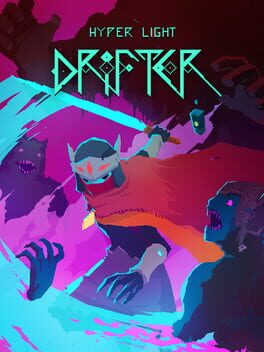For a relatively short game, Hyper Light Drifter had to grow on me. It didn't have the initial advantage of hooking me through its Link to the Past-Diablo inspirations since I've never played those games. I had no idea about the creator's heart condition which could have moved me faster to emotionally invest in the narrative. Its intentionally opaque storytelling pushed me into piecing it together on my own. The most immediately inviting game it was not.
It wasn't really even until after I had already finished the game and went back to find some of the hidden weapons and optional bosses that I found myself in a meditative mindset while playing. Maybe it was triggered by that ending scene where the Drifter, fighting ever forward in the face of this consuming black disease, sees a calming blue peace over the land, hand clutching heart one final time.
It's not a totally different experience from my replays of Salt and Sanctuary, but unlike S&S with its rather drab aesthetic and that one repeating Lateralus-era Tool riff as overworld OST, Hyper Light Drifter isn't solely reliant on "game feel". By the by, it excels there too, sword and gunplay synergizing in step with the brisk movement, the Drifter negotiating space on what always ends up a crowded, corpse-ridden dance floor, whether it's accomplished with force or elegance. It's Hotline Miami-esque in the afterglow, even, as you double back through conquered screens of pixelated, mutilated bodies.
Hyper Light Drifter is evocative. From its picture balloon "dialogue" and its melancholic Disasterpeace music to its simple yet tantalizing secret signposting and titanic archaeological landmarks, the game stirs a longing for something that's always out of reach. Playing the ill-fated hero once more, knowing what ruin surrounds the Drifter befalls him too, no matter his actions, just as the enigmatic, cataclysmic visions foretold, recasts the whole journey as rumination instead of resistance. And that's just rad.
It wasn't really even until after I had already finished the game and went back to find some of the hidden weapons and optional bosses that I found myself in a meditative mindset while playing. Maybe it was triggered by that ending scene where the Drifter, fighting ever forward in the face of this consuming black disease, sees a calming blue peace over the land, hand clutching heart one final time.
It's not a totally different experience from my replays of Salt and Sanctuary, but unlike S&S with its rather drab aesthetic and that one repeating Lateralus-era Tool riff as overworld OST, Hyper Light Drifter isn't solely reliant on "game feel". By the by, it excels there too, sword and gunplay synergizing in step with the brisk movement, the Drifter negotiating space on what always ends up a crowded, corpse-ridden dance floor, whether it's accomplished with force or elegance. It's Hotline Miami-esque in the afterglow, even, as you double back through conquered screens of pixelated, mutilated bodies.
Hyper Light Drifter is evocative. From its picture balloon "dialogue" and its melancholic Disasterpeace music to its simple yet tantalizing secret signposting and titanic archaeological landmarks, the game stirs a longing for something that's always out of reach. Playing the ill-fated hero once more, knowing what ruin surrounds the Drifter befalls him too, no matter his actions, just as the enigmatic, cataclysmic visions foretold, recasts the whole journey as rumination instead of resistance. And that's just rad.
